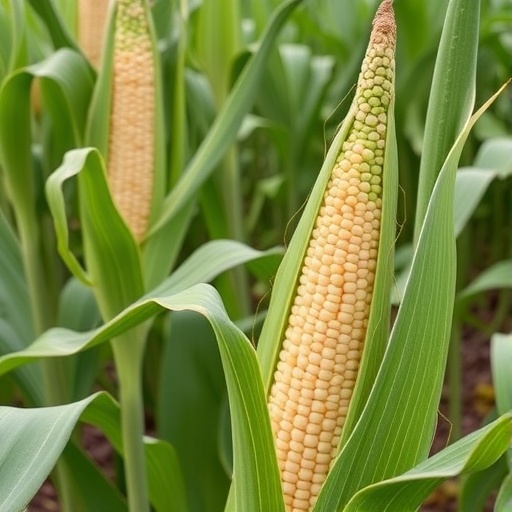In a groundbreaking study, researchers led by Wang, T., Guan, M., and Zheng, Y. have unveiled new insights into the cysteine protease gene family in maize. This comprehensive investigation, published in BMC Genomics, dives deep into the molecular characterization and expression profiling of these vital genes, revealing their critical roles in various physiological processes within this key crop species. The research represents a significant advancement in our understanding of plant biology, particularly in terms of how these proteases contribute to maize development and stress response mechanisms.
Cysteine proteases are a group of enzymes that play crucial roles in protein degradation and processing in a wide range of biological systems. Their functions in plants are vital for growth, development, and the response to environmental stimuli. The significance of the cysteine protease gene family in maize cannot be overstated, as they are involved in critical processes such as senescence, disease resistance, and stress tolerance. Wang and colleagues’ meticulous work marks an important step toward deciphering the complex interactions and regulatory mechanisms involving these enzymes.
Through advanced genomic techniques, the research team performed a genome-wide analysis of the cysteine protease gene family in maize. This involved mining the maize genome for the identification and annotation of cysteine protease genes, followed by a detailed characterization of their sequences and structures. The researchers employed bioinformatics tools to analyze the phylogenetic relationships among these genes, providing insights into their evolutionary history and functional divergence.
One of the key findings from the study was the identification of a considerable number of cysteine protease genes within the maize genome, highlighting the complexity and diversity of this gene family. The researchers found that these genes are not only abundant but also show differential expression patterns across various developmental stages and environmental conditions. Such expression profiling is crucial for understanding how maize responds to stressors, which is particularly relevant in the context of climate change and food security.
Moreover, the research identified specific cysteine protease genes that are upregulated in response to environmental stresses such as drought and pathogen attack. This information points to potential targets for genetic engineering and breeding programs aimed at enhancing stress tolerance in maize. The ability to manipulate these genes could lead to the development of maize varieties that are more resilient and yield more effectively under adverse conditions.
Another fascinating aspect of the study was the exploration of the regulatory networks influencing the expression of cysteine protease genes. The researchers examined the promoter regions of these genes to identify cis-regulatory elements that may be involved in their expression. This investigation underscores the intricacies of gene regulation in plants and the role of regulatory elements in orchestrating the expression of genes in response to various stimuli.
In addition to the technical advancements in genomics, the study also delved into the functional analysis of selected cysteine protease genes. By using transcriptomics and proteomics approaches, the team was able to correlate gene expression levels with functional outcomes in maize. This integrative approach laid the groundwork for future experiments aimed at elucidating the biological functions of individual cysteine proteases, further enriching the understanding of their roles in plant physiology.
As agriculture faces increasing pressures from climate change, the findings of this research provide a roadmap for enhancing crop resilience through genetic and biotechnological interventions. By focusing on the molecular underpinnings of the cysteine protease gene family in maize, Wang and colleagues have opened doors to innovative strategies that could lead to sustainable agricultural practices.
The implications of this research extend beyond maize as well. The methodologies and insights gained from this study can be applied to other crops and plant species, potentially aiding in the global effort to improve food security and agricultural sustainability. Understanding the role of cysteine proteases in different plant systems may unveil novel approaches for enhancing crop performance in various environmental contexts.
As the scientific community continues to explore the complexities of plant genetics, studies like this one are vital in paving the way for future discoveries. The integration of genomic data with functional studies will remain critical for advancing plant biology and addressing the challenges facing modern agriculture.
In conclusion, the comprehensive characterization and expression profiling of the cysteine protease gene family in maize represent a significant milestone in plant genomics. By revealing the intricate relationships between these genes and their broader biological functions, Wang, Guan, and Zheng are contributing to a deeper understanding of plant resilience and adaptation. Such research is invaluable as we strive to build a more sustainable agricultural future.
In essence, the work serves as a clarion call for continued research into plant gene families and their applications in crop improvement. As we stand at the cusp of a new era in agricultural science, findings like these not only enhance our basic scientific understanding but also fuel hope for innovations that can meet the food demands of a growing global population.
Ultimately, as we look forward to further studies and potential applications arising from this research, the role of cysteine proteases in maize could prove to be a linchpin in the future of crop resilience and productivity, underscoring the importance of molecular characterization and expression profiling in plant science.
Subject of Research: Cysteine protease gene family in maize
Article Title: Genome-wide molecular characterization and expression profiling of the cysteine protease gene family in maize.
Article References:
Wang, T., Guan, M., Zheng, Y. et al. Genome-wide molecular characterization and expression profiling of the cysteine protease gene family in maize. BMC Genomics 26, 789 (2025). https://doi.org/10.1186/s12864-025-12003-z
Image Credits: AI Generated
DOI: 10.1186/s12864-025-12003-z
Keywords: Cysteine protease, maize, gene family, molecular characterization, expression profiling, plant resilience, stress tolerance, genomics.




